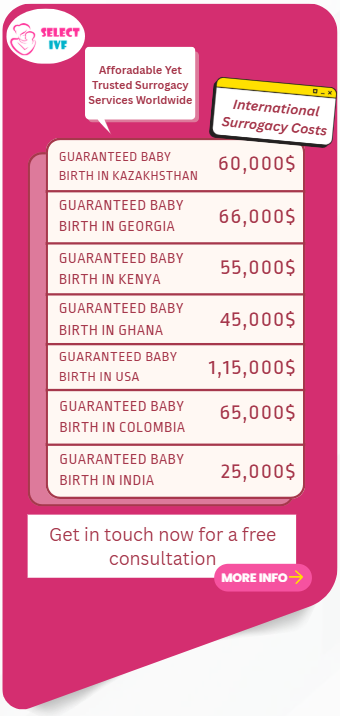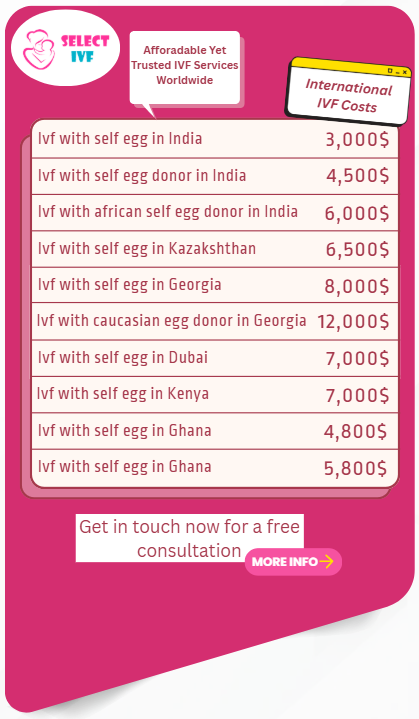Surrogacy has become a transformative option for couples struggling with infertility, offering them the chance to realize their dream of parenthood. When choosing a Surrogacy Cost Destination, factors such as cost, medical expertise, legal frameworks, and success rates play a crucial role. Select IVF serves as a trusted partner for intended parents, providing access to top-rated clinics and cost-effective surrogacy solutions across various global destinations. With personalized care and transparent guidance, Select IVF ensures that every couple embarks on this journey with confidence and hope.
What is Surrogacy?
Surrogacy is an assisted reproductive procedure which helps the intended parents to start their families when they otherwise could not. There are several reasons for which intended parents pursue surrogacy and they come from different backgrounds. All intended parents work closely together with the surrogate mothers, a woman who carries the baby in her womb until the baby born.
There are two types of surrogacy procedure which is (i) gestational surrogacy and (ii) traditional surrogacy. Gestational surrogacy is the procedure where the gestational carrier has no genetic link with the baby born. This is a procedure which is performed using IVF where embryos created in IVF lab and transfer into the uterus of the gestational surrogate. In traditional surrogacy, the surrogate eggs were used to facilitate the fertilization with the sperm of the intended father and once the fertilization takes place the resulted embryo will be transferred into the uterus of the traditional surrogate.
Is surrogacy for me?
Carrying a baby for someone else is not an easy task and it requires a lot of patience to accept this that the baby who you carry in your womb need to hand-over to someone else after 9 months and you have no relationship left with the baby. If you are strong enough to carry someone else baby then surrogacy is the best procedure through which you will help the couple’s in completing their family.
As a gestational surrogate, you are not genetically related to the baby born because the eggs of the intended mother or egg donor will be used for fertilization and resulted embryo will be placed into the gestational surrogate.
How does surrogacy work?
The full surrogacy which is also known as gestational surrogacy where the fertility expert will collect the eggs and sperms of intended parents to facilitate the fertilization using an IVF procedure. Once the fertilization takes place the embryologist will transfer the best-chosen embryo into the uterus of the gestational surrogate to establish the successful pregnancy.
The other one is the partial surrogacy which is known as traditional surrogacy where the surrogate becomes pregnant by using her own eggs which are artificially fertilized with the sperm of intended father and she will carry the baby in her womb until the baby birth.
- What is my chance of having a baby with surrogacy?
- What are the risks of surrogacy?
- Legal issues associated with surrogacy
- Where do I start?
The chances of having a baby through surrogacy half depend on that how healthy the surrogate mother is and the other half depends on the embryo transfer into her womb. Till date, the chances of having a baby through surrogacy at the hospitals and clinics under Select IVF is very high which are ranges between 55 to 80% depending on the procedure the couple is opting for the surrogacy. If you compared the success rates of having a baby under Select IVF hospitals or clinics with other fertility centres then you will find a huge variation in the success rates.
The risk of surrogacy can range from mild to severe discomfort and sometimes life-threating. Problems during the period of pregnancy may include the physical and mental conditions which can affect the health of the surrogate mother or the baby. There are some problems which do not progress, however, if they occur they may harm the surrogate mother or the baby. The following are some health conditions which a woman may experience during pregnancy such as Depression, High Blood Pressure, Infections, Nausea etc. but they are not limited. There can be more issues so before going for surrogacy you need to discuss with your doctor about the risks.
As surrogacy is a legal procedure but to run the process smooth the hospitals under Select IVF ask both the surrogate and the intended parents to sign a mutual concern which states that surrogate will hand-over the baby to his/her intended parents after the baby birth and the intended parents will bear all the expenses of surrogate until the baby birth. After the completion of the procedure, the intended parents need to file a petition in Court for seeking legal permission and the Court will order the Department of Vital Statistics to issue the new birth certificate in the name of intended parents as a legal parent.
Popular Surrogacy Destinations and Their Costs
1. India
- Cost: $18,000 – $25,000
- Overview: India offers affordable surrogacy services with experienced professionals and high-quality medical facilities. However, surrogacy in India is only available to heterosexual Indian couples under specific legal conditions.
- Why Choose India?
- Low cost compared to Western countries
- Highly skilled fertility specialists
2. United States
- Cost: $100,000 – $150,000
- Overview: The U.S. is one of the most popular destinations for surrogacy due to its clear legal framework and advanced medical technology. However, it is one of the most expensive options.
- Why Choose the U.S.?
- High success rates for IVF and surrogacy
- Legal parental rights secured before birth
3. Georgia
- Cost: $40,000 – $60,000
- Overview: Georgia is a surrogacy-friendly country with clear laws protecting intended parents. It is a cost-effective destination for international surrogacy.
- Why Choose Georgia?
- Legal surrogacy for heterosexual couples
- Lower costs with quality care
4. Ukraine
- Cost: $40,000 – $60,000
- Overview: Before the recent geopolitical conflict, Ukraine was a leading destination for surrogacy due to its affordability and surrogacy-friendly laws. However, current uncertainties make it less viable.
5. Thailand
- Cost: $50,000 – $70,000
- Overview: Thailand offers excellent medical care and experienced fertility clinics. However, surrogacy laws are restricted to Thai nationals, limiting its accessibility for foreigners.
6. Cyprus
- Cost: $50,000 – $70,000
- Overview: Cyprus has emerged as a growing hub for surrogacy due to its flexible laws and lower costs compared to Western countries.
- Why Choose Cyprus?
- No restrictions on marital status or sexual orientation
- Advanced IVF facilities
How Select IVF Helps You Choose the Right Surrogacy Destination
Selecting a surrogacy destination involves balancing costs, legal considerations, and personal preferences. Select IVF provides comprehensive guidance, ensuring intended parents make informed decisions that align with their goals and budget.
1. Personalized Cost Analysis
Select IVF offers a detailed breakdown of surrogacy costs across various destinations, highlighting the pros and cons of each option. The team ensures complete transparency, so intended parents understand all associated expenses upfront.
2. Expert Legal Assistance
Surrogacy laws differ greatly by destination. Select IVF collaborates with experienced legal advisors to guide intended parents through legal processes, ensuring compliance with local regulations.
3. Access to Accredited Clinics
Select IVF connects intended parents with reputable fertility clinics worldwide, known for their high success rates and ethical practices. This guarantees quality care and peace of mind throughout the journey.
4. Comprehensive Support Services
From surrogate screening and matching to prenatal care and post-birth formalities, Select IVF provides end-to-end support tailored to each destination’s requirements.
Surrogacy Cost Destination: Choosing the Best Option with Select IVF
Surrogacy is a transformative journey for many aspiring parents facing fertility challenges. The cost of surrogacy varies significantly depending on the destination, influenced by factors such as legal frameworks, medical infrastructure, and surrogate compensation. Choosing the right surrogacy destination is a critical decision that can impact the overall cost, quality of care, and emotional experience.
This article explores popular surrogacy destinations, their associated costs, and how Select IVF helps intended parents navigate these options to find the best-fit solution for their needs.
Understanding Surrogacy Costs
The cost of surrogacy encompasses a range of medical, legal, and administrative expenses. While specific costs vary by destination, they typically include:
- Medical Expenses
- IVF procedures, including egg retrieval, fertilization, and embryo transfer
- Prenatal care and delivery for the surrogate
- Medications for the intended mother and surrogate
- Surrogate Compensation
- Payment for the surrogate’s time, effort, and physical/emotional commitment
- Additional allowances for travel, maternity clothing, or unforeseen complications
- Legal Fees
- Drafting and finalizing surrogacy contracts
- Parental rights documentation and court procedures
- Agency and Administrative Costs
- Coordination between intended parents, surrogates, and medical professionals
- Screening and matching services for surrogate mothers
- Miscellaneous Costs
- Travel and accommodation for the intended parents
- Insurance for the surrogate
Factors Influencing the Cost of Surrogacy by Destination
The cost of surrogacy varies widely based on geographic location. Some of the most significant factors include:
- Legal Framework: Countries with clear, surrogacy-friendly laws typically offer streamlined processes, though they may come at a higher cost.
- Medical Infrastructure: Advanced fertility clinics with high success rates often charge premium fees for their services.
- Surrogate Compensation: Compensation rates differ based on the local cost of living and cultural norms.
- Intended Parents’ Residency: Legal and logistical requirements can affect costs, especially for international intended parents.
Popular Surrogacy Destinations and Their Costs
1. India
- Cost: $18,000 – $25,000
- Overview: India offers affordable surrogacy services with experienced professionals and high-quality medical facilities. However, surrogacy in India is only available to heterosexual Indian couples under specific legal conditions.
- Why Choose India?
- Low cost compared to Western countries
- Highly skilled fertility specialists
2. United States
- Cost: $100,000 – $150,000
- Overview: The U.S. is one of the most popular destinations for surrogacy due to its clear legal framework and advanced medical technology. However, it is one of the most expensive options.
- Why Choose the U.S.?
- High success rates for IVF and surrogacy
- Legal parental rights secured before birth
3. Georgia
- Cost: $40,000 – $60,000
- Overview: Georgia is a surrogacy-friendly country with clear laws protecting intended parents. It is a cost-effective destination for international surrogacy.
- Why Choose Georgia?
- Legal surrogacy for heterosexual couples
- Lower costs with quality care
4. Ukraine
- Cost: $40,000 – $60,000
- Overview: Before the recent geopolitical conflict, Ukraine was a leading destination for surrogacy due to its affordability and surrogacy-friendly laws. However, current uncertainties make it less viable.
5. Thailand
- Cost: $50,000 – $70,000
- Overview: Thailand offers excellent medical care and experienced fertility clinics. However, surrogacy laws are restricted to Thai nationals, limiting its accessibility for foreigners.
6. Cyprus
- Cost: $50,000 – $70,000
- Overview: Cyprus has emerged as a growing hub for surrogacy due to its flexible laws and lower costs compared to Western countries.
- Why Choose Cyprus?
- No restrictions on marital status or sexual orientation
- Advanced IVF facilities
How Select IVF Helps You Choose the Right Surrogacy Destination
Selecting a surrogacy destination involves balancing costs, legal considerations, and personal preferences. Select IVF provides comprehensive guidance, ensuring intended parents make informed decisions that align with their goals and budget.
1. Personalized Cost Analysis
Select IVF offers a detailed breakdown of surrogacy costs across various destinations, highlighting the pros and cons of each option. The team ensures complete transparency, so intended parents understand all associated expenses upfront.
2. Expert Legal Assistance
Surrogacy laws differ greatly by destination. Select IVF collaborates with experienced legal advisors to guide intended parents through legal processes, ensuring compliance with local regulations.
3. Access to Accredited Clinics
Select IVF connects intended parents with reputable fertility clinics worldwide, known for their high success rates and ethical practices. This guarantees quality care and peace of mind throughout the journey.
4. Comprehensive Support Services
From surrogate screening and matching to prenatal care and post-birth formalities, Select IVF provides end-to-end support tailored to each destination’s requirements.
Key Considerations When Choosing a Surrogacy Destination
When deciding on a surrogacy destination, intended parents should evaluate:
- Cost vs. Quality: While affordability is important, prioritize destinations with high-quality medical care and ethical practices.
- Legal Safety: Ensure the destination’s laws protect the rights of intended parents and surrogate mothers.
- Cultural Compatibility: Choose a location where communication and cultural understanding between all parties are smooth.
- Time Commitment: Some destinations may require extended stays or multiple visits during the surrogacy process.
- Success Rates: Research the success rates of fertility clinics in the chosen destination to maximize the chances of a positive outcome.
To become a surrogate you need to fulfil the following criteria’s:
- You should be between the age group of 21 to 35 years.
- You should young, healthy and fertile enough to carry the pregnancy for someone else.
- You should have full support from your family to be a surrogate for another woman.
- You need to pass the medical and physiological test to be a surrogate mother.
- You should have any previous history of repeated miscarriages.
- You should be a married woman with kids to bear the stress of the surrogacy procedure for someone else.
• You should not addict to any illegal drugs or alcohol to be a surrogate.
Why Choose Select IVF for Your Surrogacy Journey?
Select IVF has a proven track record of helping intended parents navigate the complexities of surrogacy across multiple destinations. Here’s why intended parents trust Select IVF:
- Experience and Expertise: With years of experience in fertility treatments, Select IVF has helped countless couples and individuals achieve their dreams of parenthood.
- Global Reach: Select IVF collaborates with leading fertility centers in top surrogacy destinations worldwide, offering a diverse range of options.
- Ethical Practices: Select IVF is committed to transparency, ethical practices, and the well-being of all parties involved.
- Holistic Support: From the first consultation to post-birth formalities, Select IVF provides continuous guidance, addressing medical, legal, and emotional needs.
Conclusion
Choosing the right destination for Surrogacy Cost Destination is a vital decision that impacts both the cost and the overall experience. Select IVF simplifies this process by offering affordable, ethical, and high-quality surrogacy programs tailored to individual needs. With a focus on ensuring the well-being of both intended parents and surrogates, Select IVF transforms the dream of parenthood into a beautiful reality, making it the preferred choice for surrogacy seekers worldwide.
FAQs for Surrogacy Cost Destination
1. What factors influence the cost of surrogacy in different destinations?
The cost of surrogacy varies based on several factors, including the country’s legal framework, medical expenses, surrogate compensation, agency fees, and additional costs like travel and accommodation. Destinations with favorable legal systems and lower medical expenses often provide more affordable surrogacy options.
2. How can Select IVF help in choosing the best surrogacy destination?
Select IVF offers expert guidance to help intended parents select a destination that aligns with their budget, legal preferences, and medical needs. We provide a comprehensive overview of costs, legal processes, and clinic quality to ensure a seamless surrogacy journey.
3. Which are the most affordable surrogacy destinations recommended by Select IVF?
Some of the most cost-effective surrogacy destinations include India (for eligible citizens), Georgia, and Ukraine. These countries offer advanced medical care, transparent legal processes, and competitive pricing. Select IVF customizes packages to suit individual needs while ensuring ethical and successful outcomes.
Read Also:
- Prominent IVF Clinic Near Dwarka: Select IVF – Bringing Dreams to Life
- Ferticity Delhi: A Trusted Partner in Your Fertility Journey with Select IVF
- Indira IVF Borivali Cost: A Comprehensive Guide to IVF Treatment
- Nova Fertility Andheri West: A Leading Destination for Fertility Treatments with Select IVF
- Comprehensive Guide to Jilla IVF Andheri West: A Select IVF Center
- Gaudium IVF Best IVF Centre in Khar Mumbai: Leading the Way in Fertility Treatment
- Ankoor Fertility Clinic Mumbai: A Premier Destination for Fertility Treatment in Mumbai









